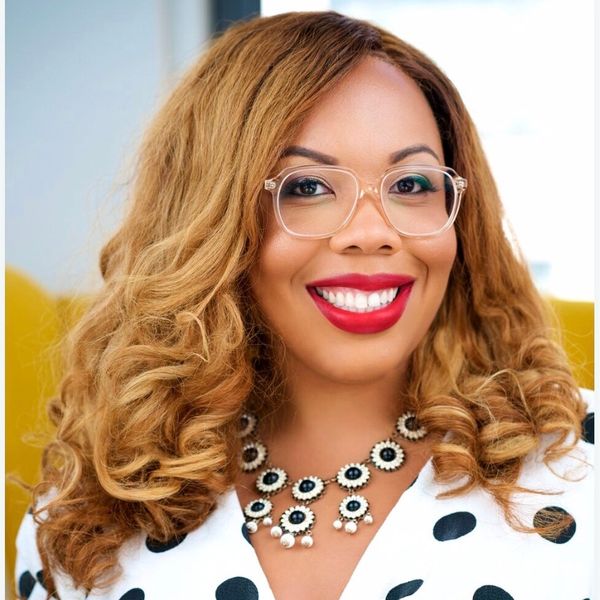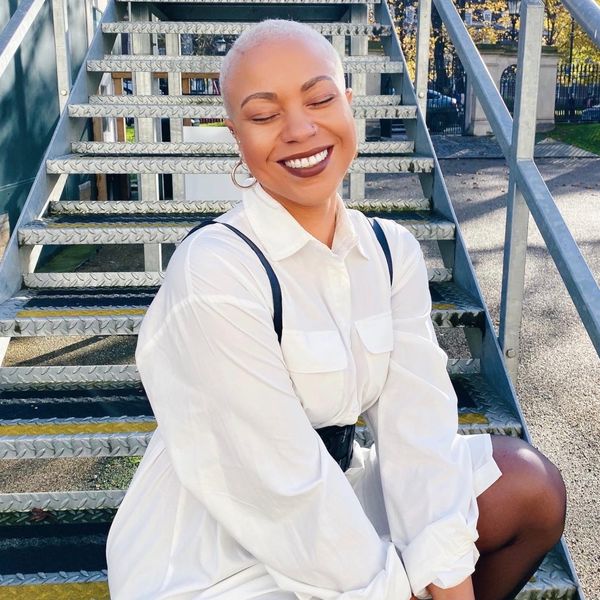
As Told To is a recurring segment on xoNecole where real women are given a platform to tell their stories in first-person narrative as told to a writer.
This is Melissa's story, as told to Charmin Michelle.
As we navigate today's racial pandemic and the symbolic gestures shared by public and private businesses and organizations, it is extremely important to move from symbolism to reality. Representation whether it's external through the vendors and services utilized, or internal through hiring, seniority and board service is a pivotal first step in inclusiveness and equity.
Over the last five years, I have served as a board member and Chair of the Board of Directors for a NYC-based organization enhancing the opportunities for children, families and social workers in the foster system, Fostering Change for Children. In 2020, I added to my passion for service by being invited and then appointed to the board of the National Job Corps Association.
In both cases, I am the only Black woman currently serving.
I knew this would be a factor, as oftentimes it is in corporate, but over time it occurred to me, that we just aren't aware of how to join a board—or it's simply something that we don't have those conversations about enough. I recently came across an article on xoNecole titled, "10 Black Women Pulling Up To The C-Suite On The Boards Of Fortune 500 Companies", and I knew I needed to share what I knew in the sector about this topic. So many of us could bring our voices to the table, for palpable change and contributions to building a more equitable society. Each one, teach one, right?
So, ladies, here's everything I know, detailed and outlined, to take that new leap in your career. I hope to see you all in the boardroom!
How To Get Started
Before we dive into this, let's answer this question: why do you want to be a board member?
Well, becoming a board member is an opportunity to exercise your passions, skills and knowledge outside of your everyday 9-5; sort of on an internal, progressive level. And the process may seem daunting if you don't know where to start.
Because I personally find deep and personal fulfillment in knowing that my decision-making and experiences are directly impacting the communities that reflect both me and my family, I decided to actually become active in researching the best ways to break into this sector.
I joined the United Way's BoardServe program, which provided me with a three-hour orientation on the inner workings of nonprofit boards, whether learning or presenting their fiduciary/monetary legal guidelines, or something as seemingly simple as taking minutes during a convening. I then completed a profile which identified my strengths (communications, branding, social impact) and interests (children, family, the arts). Following my profile creation, my data was shared with a number of organizations searching to onboard new members and then the "dating" process began.
It's important to remember that your time is valuable and your true commitment will be amplified by how connected you are to the particular cause. I engaged in approximately four meet-and-greet sessions over coffee with nonprofit CEOs who pitched me on their organization, their board member requirements and why they believed that I would be a great fit. There were some fantastic meetings, but some orgs either didn't speak to the heart of my interests, had time commitments that didn't fit my availability, or needed to do a bit more work internally before I felt comfortable lending my expertise and/or criticism to their environment.
And that's OK. We have to find what is a good fit for us.
You can search for board member training programs in your local community or identify your areas of interest. For example, when I search for organizations based in Memphis for the arts, it leads me to: https://www.artsmemphis.org/organizations. From there, I would research the Head of Advancement/Philanthropy or CEO, depending on the size and staff structure of the organization to express my interest.
Commitment Requirements
Monetary
Typical board commitments at a minimum is to give (donation) or get (solicitation through fundraising in your personal and professional networks) a financial gift. Not all organizations require board member financial obligations, but this is one of the first questions that you should ask before acting upon interest. Be certain that you can fulfill the financial commitment which can range from the low hundreds into tens of thousands of dollars depending on the board.
Time Commitment
Your next inquiry should be on the time commitment expected. Typically boards meet on a quarterly basis for 2-4 hours with breakout committees meeting in between. Based on my personal interests, I volunteer my time on the committees for events and communications which often consist of an additional two hours of phone calls each month and the work in executing our various events or deliverables.
Serving Period
The length of board service is dependent on the specific organization with some boards voting yearly on their members and others going as long as five years or indefinitely for seats. On average, you should expect to recommit every two years or to have your board use that as a marker of time served to allow someone new to come onboard.
Board Service Benefits & Development
Becoming a board member has expanded my professional network. While also a member of Alpha Kappa Alpha sorority, and dedicating myself to a lifetime of service, I can now add my two board seats to my resume. Hiring managers will now view your commitment to service as a mark of responsibility, additional training, and professionalism.
Access is key to Black women shattering the glass ceiling.
By opening your circle's influence through board service and volunteerism, you can connect with additional and like-minded peers who can speak to your ability to get things done. That's what we are best at. It's up to us to validate our purpose. Nonprofit board service is a wonderful entry point into corporate board service, which in addition to opening your network, can also pay off in major dividends as board members are compensated for their time. Becoming a board member will align with your passion, connect with your community, and give you the very important opportunity to represent so many of us who've had muffled voices for generations; the voices of those who look like us.
Melissa C. Potter Monsanto is dedicated to standing at the forefront of impact, innovation, and social responsibility by using entertainment, media, partnerships and advocacy as a catalyst for social change. Follow her on Instagram at @melissacpotter to keep up with her journey or to ask more questions about starting your board journey.
Featured image courtesy of Melissa Monsanto
Charmin Michelle is a southern native and creative spirit who works as a content marketer and events manager in Chicago. She enjoys traveling, #SummertimeChi, and the journey of mastering womanhood. Connect with her on Instagram @charminmichelle.
Exclusive: Melanie Fiona On Making High-Vibrational Music & Saying Yes To Partnership
Melanie Fiona is back! After taking a little more than a decade-long hiatus, she has officially made her return to music and blessed us with two singles, “Say Yes” and “I Choose You.” While both singles are very different from each other, they both reflect who she is today and the type of music she wants to make. In our conversation, the mom of two expressed what she learned during her time away.
“It's interesting, even when I said it is like coming back, I don't ever feel like I really left because I was always still performing. I've still been public. It's not like I went into being this recluse person or version of myself, but the thing that I really learned in this process is that I think things take time,” Melanie says in a xoNecole exclusive.
“I think often we're so caught up in it, being on the timing of demand or popularity, or, like, striking while the iron is hot and the thing that I've learned is that everything is on God's time. That's it. Every time I thought I would have been ready, or, like, things were taking too long, I had to reship some things, personally, professionally, in my life. I also gave myself permission to make a living, not just make a living, but make a life for myself.”
Making a life for herself included getting married to Grammy-nominated songwriter Jared Cotter, starting a family, and embracing new landscapes, such as podcasting as a co-host of The Mama’s Den podcast. She also began doing more spiritual work and self-care practices like meditation, sound healing, Reiki, acupuncture, and boundary setting, which allowed her to get in touch with her inner voice.
“I wasn't putting out music, and I wasn't experiencing a number one record, but I was being a number one mom,” she says.
“I was experiencing things that were allowing me to heal and get in touch with myself so that I could make new music from a space of joy and freedom, and excitement again because I definitely feel like I did lose some excitement because of just politics and industry and what it can do to your mental health and even your physical health. So giving myself the space to really just say, ‘Hey, it's okay. Everything's right on time.’”
The joy and excitement are felt in one of two new singles, “I Choose You,” which is more of a lovers rock vibe, a tribute to Melanie’s Caribbean roots. While the Grammy award-winner is known for ballads like “It Kills Me” and “Fool For You,” she is becoming more intentional about the music she makes, calling it high-vibrational music. She says her music is a “reflection of my life,” as it captures every facet, from hanging out with friends to riding around in her car.
“Say Yes” has the classic R&B vibe Melanie is known for. However, both songs are inspired by her relationship. Melanie and Jared got married in December 2020, and the Toronto-bred artist dished on their relationship. Fun fact: he is featured in the “Say Yes” music video.
“When we first started dating, I had come into that relationship post a lot of self-work. I had gotten out of a long-term relationship, I had a year and a half to date and be by myself and do a lot of work on myself alone. And when we met, I remember feeling like this has to be my person because I feel it,” she says.
“And so when we went into that relationship, and we started dating, I was very clear. I was like, I know what I want. I'm very clear on what I need, and I'm not going to withhold my truth about myself in this process because of pride or fear of rejection. I know you love me, but I'm coming with my heart in my hand to let you know that if we're gonna get there, we have to put fear aside and say yes. So that was kind of like my open letter to him, which is why the video is us having a conversation.”
Melanie also shares that saying yes to her partner has empowered her in many ways, including motherhood and showing up for herself. Her new EP, also titled Say Yes, will be available at the top of 2025.
Check out the full interview below.
Let’s make things inbox official! Sign up for the xoNecole newsletter for love, wellness, career, and exclusive content delivered straight to your inbox.
Feature image by Franco Zulueta
Entertaining Like Ayesha Curry: Expert Advice For Holidays Done Right
Be prepared to wow the crowd.
It’s officially the holiday season, which means parties and gatherings galore. Between Friendsgiving, Christmas, and New Year's Eve celebrations, many of us are preparing to host loved ones in our homes one or two times between now and the end of the year. No matter the occasion or season, hosting for family and friends is a labor of love. But we can also agree that entertaining can be overwhelming, especially for first-time hosts.
As a seasoned host and entertainer, Ayesha Curry knows something about creating a memorable event for loved ones. Whether preparing for an intimate dinner with your immediate family or hosting a larger crowd, your guests will think you are a pro this holiday season with her tips on everything from welcoming guests to setting a beautiful table.
Q: What is your top tip for hosting?
Ayesha Curry:Part of being a great host is spending time with your guests, which means you can’t be stuck in the kitchen. Prep is key! I usually serve wine with the meal, but a cocktail or mocktail is a great way to greet guests. I prep the garnish the night before and batch the drink just before guests arrive. When the party begins, I pull everything out of the fridge and am ready to serve.
Writer Note: If you would like to offer non-alcoholic beverages for your sober or sober-curious guests, I love Saint Viviana Cab. It maintains full-body cabernet and flavor; no one will ever guess it’s alcohol-free. You can easily create a signature mocktail using Bittermilk’s Smoked Honey Whiskey Sour mix.
Q: Do you suggest any prep for serving or cooking?
AC:I lay out all my serving dishes and utensils the night before with little post-it notes saying what goes where. That way, I’m not digging around for anything. For more elaborate menus, I lay out quarter sheet pans and label them with tape according to the dish. I prep and measure everything for each recipe and then load each sheet pan with everything needed to make the dish. I wrap each tray in saran or foil, stack them, and place them in the fridge. Pull out the sheet pan you need when cooking, and everything is ready. It’s something I learned at the restaurant that saves so much time.
Q: What’s one item that should always be on a dinner party menu?
AC: Bread or roll with butter is excellent for holding guests over if the kitchen is delayed.
Q: What’s one non-menu item you should always have on hand?
AC: For a non-menu item, wine!
Q: How do you decide on a theme or menu for a gathering?
AC: It all starts with the occasion and the guest list. If it’s a group that doesn’t know each other very well, I may get more elaborate with the theme to help break the ice. For a group of friends or family who don’t get to see each other very often, I usually keep it simple so the evening can be all about catching up. A great playlist, good wine, and a family-style menu are all you need.
Q: Should attendees be expected to bring a gift?
AC: If I’m hosting, I’m not expecting gifts. The gift is taking time to come over and enjoy a meal with me! But bringing something to enjoy at the gathering, like a bottle of wine, is always appreciated.
Q: What are three affordable gifts that guests can give a host?
AC:A bag of excellent coffee is a beautiful gift for a host. Sweet July’s House Blend Coffee is sourced from all-female co-ops, so it’s a gift I love to give to the women in my life. Whether it’s being served after dinner or just for the host to enjoy on their own, you can’t go wrong with a bag of high-end coffee.
Fresh flowers are great if you have a host who likes total control over the food and beverage menu. Go for something neutral in color that can work with any décor.
The Sweet July Olive Oil and Balsamic Vinegar set is my go-to host gift. Bottled in Napa, it’s a gift any foodie will appreciate - and use!
Q: What are some creative tablescape or decor ideas that you love?
AC: I like to keep my dinnerware neutral and classic (like this ceramic collection in nutmeg) and infuse color and texture through linens. For centerpieces, I want to use what I have in my yard. If it’s summer, it might be flowers or greenery, but interesting branches can also look architectural in tall, clear vases next to tapered candles in the colder months. There’s no need to spend a ton of money on flowers.
With Ayesha’s tips, you can create a holiday gathering that your family and friends will cherish forever.
Let’s make things inbox official! Sign up for the xoNecole newsletter for love, wellness, career, and exclusive content delivered straight to your inbox.
Featured image by Getty Images









